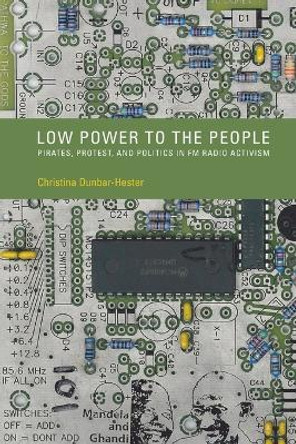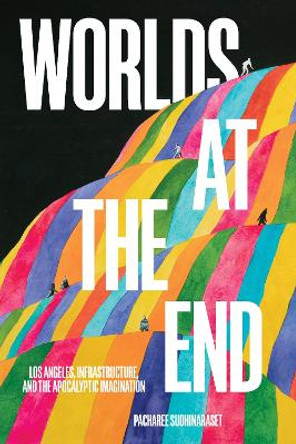Description
San Pedro Bay, which contains the contiguous Ports of Los Angeles and Long Beach, is a significant site for petroleum shipping and refining as well as one of the largest container shipping ports in the world-some forty percent of containerized imports to the United States pass through this so-called America's Port. It is also ecologically rich. Built atop a land- and waterscape of vital importance to wildlife, the heavily industrialized Los Angeles Harbor contains estuarial wetlands, the LA River mouth, and a marine ecology where colder and warmer Pacific Ocean waters meet. In this compelling interdisciplinary investigation, award-winning author Christina Dunbar-Hester explores the complex relationships among commerce, empire, environment, and the nonhuman life forms of San Pedro Bay over the last fifty years-a period coinciding with the era of modern environmental regulation in the United States. The LA port complex is not simply a local site, Dunbar-Hester argues, but a node in a network that enables the continued expansion of capitalism, propelling trade as it drives the extraction of natural resources, labor violations, pollution, and other harms. Focusing specifically on cetaceans, bananas, sea birds, and otters whose lives are intertwined with the vitality of the port complex itself, Oil Beach reveals how logistics infrastructure threatens ecologies as it circulates goods and capital-and helps us to consider a future where the accumulation of life and the accumulation of capital are not in violent tension.
About the Author
Christina Dunbar-Hester is a science and technology studies scholar and associate professor in the University of Southern California's Annenberg School for Communication. She is the author of Low Power to the People: Pirates, Protest, and Politics in FM Radio Activism, winner of the McGannon Award for Social and Ethical Relevance in Communications Technology Research, and Hacking Diversity: The Politics of Inclusion in Open Technology Cultures, winner of the Information Science Book of the Year Award from the Association for Information Science and Technology.
Reviews
"The ports have not eliminated nature or automated away the human presence. Instead, they warp and engulf these lives. . . . Wherever you look, there is capital and its infrastructures, a ghastly Sublime. . . . Instead of the Alps, a dense network of machines and money. . . . A leitmotif in Oil Beach is the way that capitalism brutally sorts out life, marking some people for immense wealth and others for homelessness or cancer, tagging certain nonhuman species as economically useful or aesthetically pleasing while consigning others to death via pollution and climate change. Our geographies-material or imaginative-are never just." -- Ryan Boyd * Public Books *
"California has long been a byword for the clash between the environment and capitalism. Science and technology studies scholar Dunbar-Hester investigates Long Beach near Los Angeles: a hub for petroleum shipping and refining, and a world-leading container-shipping port, but also a wetland area full of wildlife. Focusing on cetaceans, bananas, sea birds, and otters, her informed interdisciplinary study considers how to avoid toxic tension between biodiversity and capital accumulation." * Nature *
"Having thoroughly researched the environmental impact of these ports, Dunbar-Hester makes the case that San Pedro Bay has become a sacrifice zone to oil distribution and expanding global trade, with some environmental mitigation considered a cost of doing business." * Library Journal *
"Fascinating. . . . While Oil Beach comes in at just 250 pages or so, about a third of which is notes, Dunbar-Hester manages to pack in everything from oil drilling platforms disguised as palm-filled islands, to the ethics of cleaning oil-soaked birds with petroleum-derived products at oil-company funded facilities, to the effects of mechanization on banana shipping, and US Navy experiments on living on the seafloor-including having a dolphin deliver mail." * Halifax Examiner *
"Dunbar-Hester (communication, Univ. of Southern California) uses the industrialized backdrop of the ports in Long Beach and Los Angeles in Southern California to illustrate how US trade, energy, and transportation systems impact local and regional environments . . . Highly recommended." * Choice *
"Rich in detail, critique, and conceptual exploration, Oil Beach is an 'unnatural history' of the relations of wildlife, other 'life-forms,' global shipping, a port, and petroleum infrastructure. . . . With its exploration of 'infrastructural vitalism,' Oil Beach compellingly contributes to a scholarly conversation about infrastructures and environments." * H-Environment *
"Oil Beach is an engaging critique, brimming with side-angle facts and ideas... Dunbar-Hester casts a wide net across well-indexed and referenced sources, appealing to a wide readership." * Marine Biologist *
"This book is about the gradual takeover of industrial landscapes over local fauna in one of the world's most prominent sites of capitalist extraction and transportation. Dunbar-Hester . . . has selected an extremely rich case study in San Pedro Bay and the Port of Long Beach. . . . Despite the gloomy topic, Oil Beach also considers possibilities for wildlife restoration and the cohabitation between different life-forms. It's influenced by Anna Tsing's understanding of capitalism as a destructive force that still allows for forms of collaborative survival. . . . Sitting at the crossroads of critical urban studies and science and technology studies, it will interest readers looking for sound case studies looking at the consequences of urban and industrial development over port complexes." -- Clarence Hatton-Proulx * Journal of Urban Affairs *
"Although the volume itself is rather slim, it should enjoy wide reading. Dunbar-Hester integrates environmental and technological histories to create a new and insightful analysis of the ecological effects of industrial capitalism." -- Michael Camp * Technology and Culture *
"Dunbar-Hester walks us through Southern California's complicated coastal landscape to show how this region has been built as a place where 'multitudinous life is juxtaposed with patterned violence.' It is an invaluable lesson at a moment when we are grappling with solutions to rectify the deadly spaces that have been built in pursuit of profit and military power. As Oil Beach shows, looking at the world through a multispecies lens is necessary if we are to repair what have become destructive ecological relationships and values." -- Juan De Lara, author of "Inland Shift: Race, Space, and Capital in Southern California"
"Oil Beach accomplishes that rarest of feats: it transforms the way the world looks, bringing into view the hidden logic that structures the very ground beneath our feet. The story of the LA ports is hugely consequential and, in Dunbar-Hester's hands, it's also exhilarating, encompassing both the broad sweep of change and the small details that give meaning to our landscape. It's unusual to find an academic book that's hard to put down, but Dunbar-Hester's smart, sometimes funny, and always eloquent voice is truly singular." -- Miriam Posner, University of California, Los Angeles
Book Information
ISBN 9780226819716
Author Christina Dunbar-Hester
Format Paperback
Page Count 272
Imprint University of Chicago Press
Publisher The University of Chicago Press
Weight(grams) 399g
Dimensions(mm) 229mm * 152mm * 20mm









